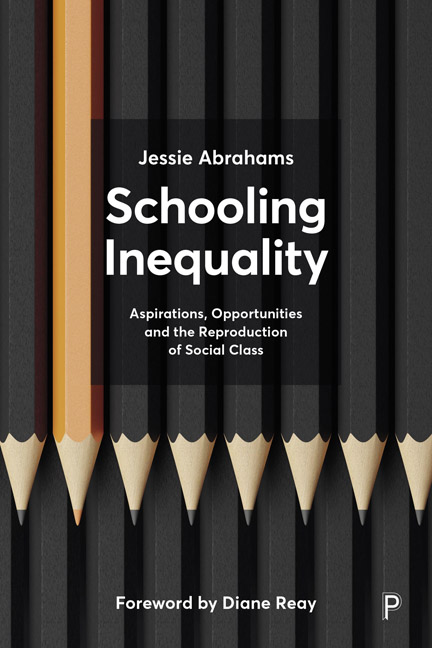Book contents
- Frontmatter
- Dedication
- Contents
- List of figures and tables
- List of abbreviations
- Acknowledgements
- Foreword
- Introduction
- 1 Reproduction: social class inequality in education
- 2 The three schools
- 3 Aspiration, aspiration, aspiration: “The only thing they’ve forced me to do is keep my options open”
- 4 Knowledge, familiarity and physical proximity: “Everyone in my family has gone to university, I don’t see why I shouldn’t”
- 5 Option blocks that block options (GCSEs)
- 6 Packages, facilitating subjects and ‘keeping the options open’ (A levels)
- 7 Institutional concerted cultivation
- 8 Aim lower: leashing aspirations and internalising notions of (in)ability
- 9 Jake’s story: a journey to reflexivity
- Conclusion
- Appendix I Questionnaire
- Appendix II Parental Standard Occupational Classification 2010 groups
- Appendix III Grand Hill Grammar careers event question sheet
- Appendix IV Vignette sample
- Notes
- References
- Index
1 - Reproduction: social class inequality in education
Published online by Cambridge University Press: 18 December 2024
- Frontmatter
- Dedication
- Contents
- List of figures and tables
- List of abbreviations
- Acknowledgements
- Foreword
- Introduction
- 1 Reproduction: social class inequality in education
- 2 The three schools
- 3 Aspiration, aspiration, aspiration: “The only thing they’ve forced me to do is keep my options open”
- 4 Knowledge, familiarity and physical proximity: “Everyone in my family has gone to university, I don’t see why I shouldn’t”
- 5 Option blocks that block options (GCSEs)
- 6 Packages, facilitating subjects and ‘keeping the options open’ (A levels)
- 7 Institutional concerted cultivation
- 8 Aim lower: leashing aspirations and internalising notions of (in)ability
- 9 Jake’s story: a journey to reflexivity
- Conclusion
- Appendix I Questionnaire
- Appendix II Parental Standard Occupational Classification 2010 groups
- Appendix III Grand Hill Grammar careers event question sheet
- Appendix IV Vignette sample
- Notes
- References
- Index
Summary
The chances of entering higher education can be seen as the product of a selection process, which throughout the school system is applied with very unequal severity, depending on the student's social origin. In fact, for the most disadvantaged classes, it is purely and simply a matter of elimination.
(Bourdieu and Passeron, 1979: 2, emphasis in original)This quote points to the barriers facing young people from disadvantaged backgrounds as they navigate an education system where their culture, practices, knowledge, tastes and dispositions (habitus) are constantly and arbitrarily denigrated. One of the major reasons cited for this ‘elimination’ in respect of higher education (HE) relates to the ‘attainment gap’; young people from disadvantaged backgrounds have continued to achieve lower General Certificate of Secondary Education (GCSE) grades than their advantaged counterparts. In 2015 only 33.1 per cent of pupils eligible for free school meals achieved five A⋆– C GCSEs including English and maths compared to 60.9 per cent of other pupils (DfE, 2016a: 21). Major government reports such as the 2003 White Paper touch on the need to ‘raise attainment’ but arguably not in any substantial way:
Success in opening up higher education to all who have the potential to benefit from it depends on building aspirations and attainment throughout all stages of education … young people and their families need to be encouraged to raise their aspirations and achieve more of their potential in examinations prior to entry to higher education. (DfES, 2003: 68)
Despite acknowledging the need to increase attainment in schools, there is no discussion in this document of how this is to be achieved. There is an apparent assumption that raising aspirations is the key to raising attainment. And this narrative has been notably pervasive within widening participation practice over time (Harrison and Waller, 2018; Rainford, 2023). This individualistic focus is not unusual in government rhetoric aimed at closing the attainment gap, and it is pervaded by the discourse of meritocracy; the belief that if you work hard and aim high you will achieve your goals, regardless of background. Bourdieu argues that meritocracy is a ‘sociodicy’, an ideological tool used to mask the real structural inequality in the system (Bourdieu and Passeron, 1979). Similarly, Reay argues that ‘[t] he myth of meritocracy normalises inequalities, converting them into individual rather than collective responsibilities’ (Reay, 1998a: 1).
- Type
- Chapter
- Information
- Schooling InequalityAspirations, Opportunities and the Reproduction of Social Class, pp. 9 - 22Publisher: Bristol University PressPrint publication year: 2024

